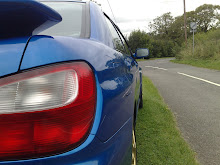The way you have to look at it is that the thing is broken anyway and its worth a shot.
you will need
A soldering iron with fine tip
Multicore solder (fluxed)
Feeler gauges (you will see why)
Nerves of steel
Here goes,
Its in tight a good tug will release it

Thats the back clips off now the front ones
put your fingers down left hand side and pull like your life depends on it. Its in tight so nerves of steel required, you wont break any clips (Trust me)
And pull
Thats one side done now pull like crazy on the other side its in hard..... be brave!
Now with surround out disconnect the wiring harness plug from clock
Now removing clock itself is tricky, get some feeler gauges and slide them in side shown in picture
This is in really tight and twist it so you are forcing gently the clock unit backwards away from the surround not up or down

this is in really tight be brave and be carefull not to lever in the front part of clock housing as this is the screen
once you get this side out the other side will come out using a bit of tugging bend the clip back using fingers and out it pops
Now seperate the face from the back do this on a table not in the car as the buttons will fall out. just move the tabs gently up these are brittle so be careful
see tabs just lift them gently and pull face off

see resistor pictured left R510

see resistor pictured left R510
Now once inside you can see resistor pictured with ball point pen this is the one, use a fine tipped soldering iron and a dab of solder on the end contacts. It will look like nothing is wrong with it but if you wiggle it you will see which side is loose but i re did both as a precautionary measure.
Now pop it all back together and try it out
It worked for me
however i cant be held responsible for your own actions and damage caused be carefull and if in doubt ask a grown up for help and dont burn yourself soldering irons are hot!
Best of luck feel free to add your comments





This repair worked for me! I was surprised that I had the identical problem, down to the exact same defective solder joint on the same surface mount resistor. Although it has been less than 24 hours, it seems to be fixed. Thanks
ReplyDeleteThis Repair also worked for me :) cheers for the write up!
ReplyDeleteSorted my fault as well, seen a service for £10 on ebay to do this ...it only takes 5 mins from pulling the unit out to plugging it back in...cheers for write up...nice 1..
ReplyDeletei just fix that today as well brilliant thanks for write up
ReplyDeletethanks allot man i had the same problem and now i fixed it :P rip
ReplyDeleteThank you! From New Zealand.
ReplyDeleteThanks again from New Zealand, worked a treat for me.
ReplyDeleteCareful-- when pulling up on mine, it cracked & broke into a few pieces. I was able to epoxy them back together, but still...
ReplyDeleteIts awesome! I had the same problem since 2 days ago - and I fixed it this morning. Thanks!
ReplyDeleteTook ten minutes to fix! I have been waiting months to sort out that clock. Thank you.
ReplyDeletemine cracked where can i get new plastic panel ?
ReplyDeleteThanks man, had the same exact problem and your tutorial worked like magic. I now have a clock in my car something the dealer was asking me to get a new clock.
ReplyDeleteI repaired my impreza gx last year and my Subaru wrx this year same fault
ReplyDeletethanks a lot
Just a note for others out there - check all three resistors. There are two 300 and one 510 ohm resistors and any one of them may have a bad solder joint. If in doubt, touch up all the solder joints on the resistors (carefully, don't add any if there is already some there).
ReplyDeleteThanks for the write up - getting the trim off the interior of a car is always the hardest part and this is the easiest way I've seen so far.
Thank you so much. I bought my 2001 Impreza RX last week and the clock wasn't working. It irked me so I thought I'd look up to see if it was fixable, found your tutorial and it worked! just the way you said. I did it and I'm a woman! :) Thank you!!
ReplyDeleteWorked for me as well. All 3 large resistors needed soldering. Thanks for the detailed instructions.
ReplyDelete